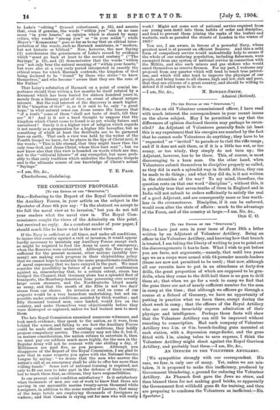THE CONSCRIPTION PROPOSALS.
[To THE EDITOR OP THE " SPECTATOB."] Sfit,—Referring to the Report of the Royal Commission on the Auxiliary Forces, in your article on the subject in the Spectator of June 4th you say "In the abstract we accept to the full the naval view as to invasion," but you do not tell your readers what the naval view is. The Royal Com- missioners sought the views of the Admiralty on this point, but received no reply. As a constant reader of your paper, I should much like to know what is the naval view.
If the Navy is sufficient at all times, and under all conditions, to insure this country against a raid or invasion, it would appear hardly necessary to maintain any Auxiliary Forces except such as might be required to feed the Army in cases of emergency, when the Reserves were exhausted. Although the Navy may be sufficient for the present moment, other nations (notably Ger- many) are making such progress in their shipbuilding policy that we cannot hope to maintain the same proportionate condition of naval supremacy that we have enjoyed in the past. We must consider the possibility in future of a great naval combination against us, remembering that, to a certain extent, steam has bridged the Channel, that Germany alone has a splendid fleet of transports, the Hamburg-American Line possessing over seventy large ocean steamers, and the Norddeutsche Lloyd nearly as many, and that the mouth of the Elbe is not two days' steam from our shores. An invasion or raid on some of our seaports would be a very hazardous undertaking, but not im- possible under certain conditions, assisted by thick weather; and fifty thousand trained men, once landed, would live on the country, and make themselves very objectionable before they were destroyed or captured, unless we had trained men to meet them.
The late Royal Commission examined numerous witnesses, and took much evidence; they speak to the nation, as it were, from behind the scenes, and failing to see how the Auxiliary Forces could be made efficient under existing conditions, they boldly propose compulsory service. The country may not like it, but if, on mature consideration, the nation refuses to entertain it, then we must pay our soldiers much more highly, for the men in the Regular Army will not be content with one shilling a day, if Militiamen are paid five, as you propose. Although you disapprove of the Report of the Royal Commission, I am glad to note that in some respects you agree with the National Service League by saying : "we desire that the men who answer the nation's call at an emergency shall be able to offer her more than willing hands." Some sort of national training is required, not only to fit our men to take part in the defence of their country, but to teach them that, as citizens, they have responsibilities.
Is our present social condition satisfactory ? Is it satisfactory when thousands of men are out of work to know that there are serving in our mercantile marine twenty-seven thousand white foreigners, in addition to the same number of Lascars ; that many of the large hotels are employing thousands of foreigners as waiters; and that Canada is crying out for men who will really work? Might not some sort of national service required from our young men instil• into them habits of order and discipline, and tend to prevent them joining the ranks of the loafers and wastrels, such as paraded the streets of London in the winter of 1903?
You are, I am aware, in favour of a powerful Navy, whose greatest need is at present an efficient Reserve. And this a mild form of compulsory service would undoubtedly help to secure if the whole of our seafaring population, including fishermen, were exempted from any system of national service in connection with the Militia, and also such miners and gas stokers who would enrol themselves as reserve firemen. For my part, I welcome any proposal from any quarter which will tend to teach true patriot- ism, and which will also tend to improve the physique of our people, and bring home to all classes, high and low, rich and poor, that they are citizens of a great country, and should be willing to defend it if called upon to do so.
Admiral (Retired).














































 Previous page
Previous page